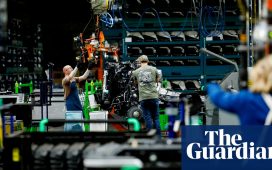A New Era of Transportation: Government Investments and Strategic Tech Amid Interest Rates
In the dynamic landscape of American infrastructure, recent government investments have sparked a revolution in transportation operations. With enhancements in capacity, efficiency, safety, and sustainability, the automation industry, particularly in third-party logistics, is thriving.
The Healey Driscoll Administration in Massachusetts recently announced a $50 million investment in initiatives to expand electric vehicle (EV) charging infrastructure. Funded by the American Rescue Plan Act, this investment aims to increase charging accessibility for residents, electrify the state fleet, and improve the operation of public charging stations.
The Interplay of Investments and Interest Rates
Despite higher interest rates prompting companies to strategize their investments, the push for modernization due to labor shortages and growing customer expectations has sustained the momentum for strategic investments in technology.
Companies are turning to cost-effective solutions, such as autonomous mobile robots, to address workforce challenges and keep pace with e-commerce demands. These technologies are not only aiding in the automation of loading and unloading trucks but also integrating artificial intelligence, machine vision, and mobile robots to increase precision, safety, and speed in operations.
Electrifying the Future of Transportation
The Massachusetts initiative will fund multiple projects to advance transportation electrification, including curbside parking for EV owners in multi-unit dwellings, medium and heavy-duty electrification, mobile charging solutions, and ride-for-hire vehicle electrification.
This investment aims to break down barriers to widespread EV adoption and help Massachusetts meet its ambitious greenhouse gas emissions targets. The funding will also support innovative EV technology programs, charging infrastructure investments for the state fleet, and advanced tracking and inventory management systems.
The Economic Impact of Public Transit
The economic impact of public transit is undeniable. In Missouri, for example, Metro Transit’s service area contributed nearly $2.5 billion to the total economic impact. The 2023 investment by the state of Missouri represents a 34% increase over 2022 and a more than 580% increase since 2021.
These investments underscore the importance of continued government funding in transportation. As the industry evolves, so does the need for strategic investments that prioritize flexibility, adaptability, and sustainability.
In the grand scheme of global transformation, these government investments herald a new era of transportation, one that is efficient, sustainable, and powered by strategic technological advancements.
As we navigate this evolving landscape, the interplay of government investments, interest rates, and technological innovation will continue to shape the future of transportation, driving us toward a more connected and sustainable world.











